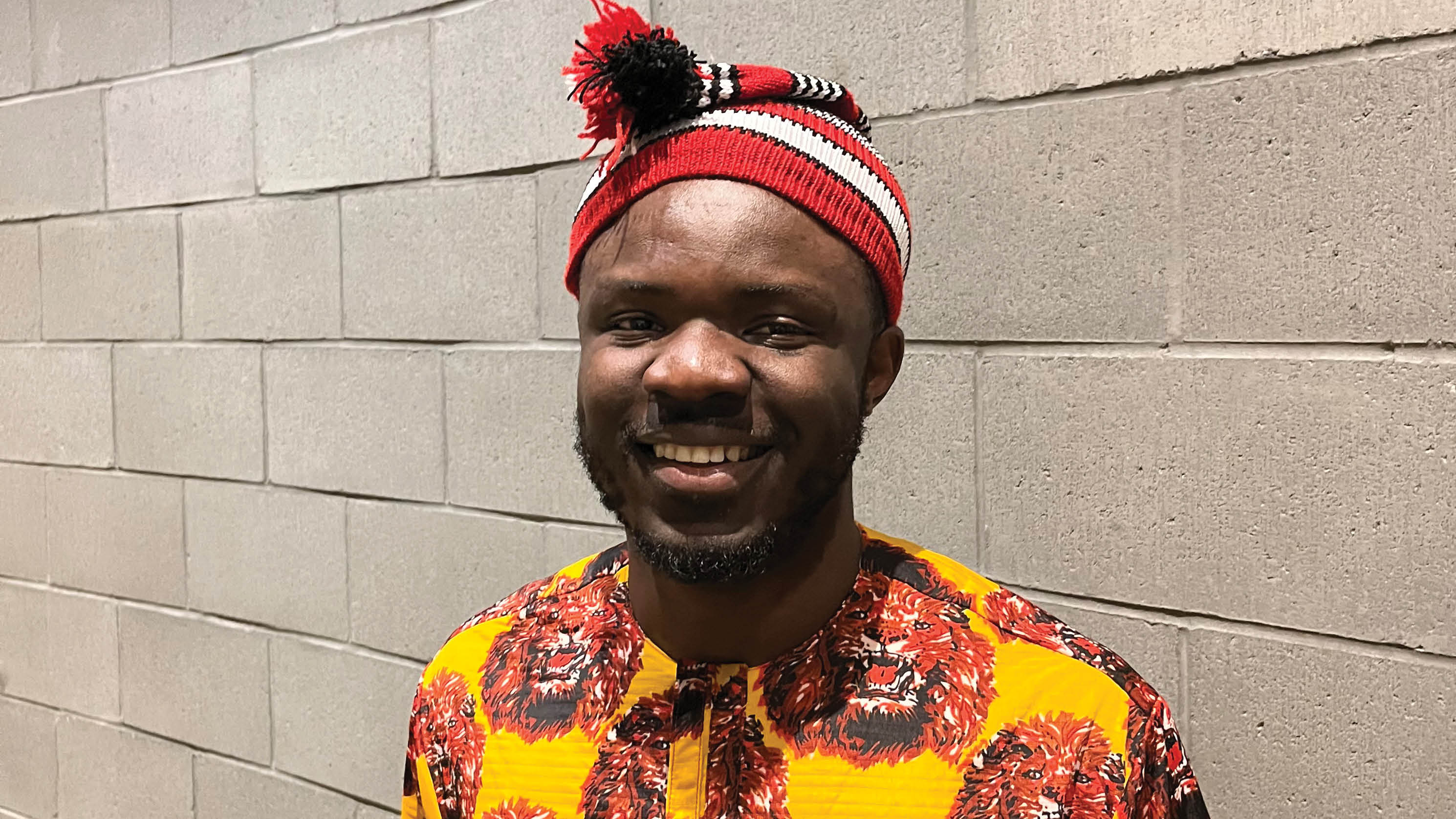Nnaemeka Hubert Odikamnoro, former MA Student of French Studies, shares about his research on language attitudes towards major languages in Nigeria (Part 1) and about his graduate student experience at UBC (Part 2).


Hubert in a traditional Isi Agu igbo attire, at the Black History Month Event at the Chan Centre for the Performing Arts, UBC, February 2024.
Part 1: Research
“I assumed language only performed communicative functions, but after learning how ideologies and attitudes could be propagated by language, I was immediately sold.”
What drew you to sociolinguistics?
I’m not entirely sure what I expected to gain when I set out to pursue a Master’s in French, but now that I’ve completed it, I can say it brought me so much more than I’d imagined. Initially, it was mostly about earning a Master’s degree—almost a natural step forward in the same field as my undergraduate studies. But after those first few courses, my perspective changed. I started to see a whole new side to language studies, with so many intriguing angles to explore.
That’s when I found myself drawn to sociolinguistics, and it completely captured my interest, adding a depth to my studies that I hadn’t anticipated. It was really fascinating to see how much of a role language had in society. Before then, I assumed language only performed communicative functions, but after learning how ideologies and attitudes could be propagated by language, I was immediately sold.
What was your research topic?
My research project, titled “A study of the language attitudes of the Igbos towards the major languages in Nigeria,” focused on exploring linguistic attitudes among the Igbo people in Nigeria, specifically toward the country’s three dominant languages: Igbo, Hausa, and Yoruba. Through open-ended questionnaires, I gathered responses from Igbo participants and analyzed the data using MaxQDA; a software for thematic analysis.
The main findings showed that Igbo speakers hold positive attitudes toward their own language and its speakers, while demonstrating more negative attitudes toward Hausa and ambivalent views toward Yoruba. The results highlighted underlying biases that may impact intergroup relations and national cohesion in Nigeria.
What was it like working with your Graduate Supervisor?
My graduate supervisor, Dr. Marie-Eve Bouchard, was honestly one of the best things UBC gave me. Working with her wasn’t always easy—she pushed me to bring out my best and set high standards that, at first, felt pretty intense. But that’s where the real learning happened. Because of her, I picked up so many skills and habits that have stuck with me. Her dedication to getting things right taught me the value of thoroughness and taking pride in the work I do, even when it’s tough. There were times I wondered why we needed to be so meticulous, but looking back, I get it now. Her work ethic and commitment to excellence made a big impression on me, and it’s something I try to carry into my own work. Working with her really shaped me, and I’m grateful for the personal and professional growth I gained along the way.
Part 2: Graduate Student Experience
“Grad school wasn’t going to get easier; I just had to get better at handling it. Once I accepted that, I was able to start enjoying the smaller things.”
What was your overall graduate student experience like?
My experience as a graduate student was a mix of challenging and exciting, and looking back, I can say it was a journey that changed me in so many ways.
In the beginning, it was genuinely difficult. I was adjusting to a completely different education system, which was so unlike what I had known back home in Nigeria. Everything felt new and unfamiliar, and I was more or less thrown into it all without much guidance on what to do or when to do it.
Over time, though, I began to get the hang of things—mostly by coming to terms with the fact that grad school wasn’t going to get easier; I just had to get better at handling it. Once I accepted that, I was able to start enjoying the smaller things.
I began to make a deliberate effort to appreciate the moments that made the experience richer: the casual conversations with colleagues, unwinding in the lounge, and attending the few social events I could fit into my schedule. These moments became my favorite parts of the program. They reminded me that, beyond the academics, there were connections and experiences that made the journey worthwhile.
How has obtaining an MA in French Studies benefitted you since graduating?
The skills I developed during the program are already proving invaluable. The research, critical thinking, and analytical skills I gained have strengthened my approach to problem-solving and communication in meaningful ways. Plus, the experience of working across cultural and linguistic perspectives has enhanced my adaptability—a quality that I know will be an asset in any professional setting.
Currently, I’m working part-time as a French teacher while actively seeking a more permanent position. I’m also preparing to transition to permanent residency soon. Additionally, I’m considering taking on a new challenge, possibly returning to school or exploring another field of study, where I know my bilingualism will be a valuable asset.
Interested in Graduate Studies?
For those who are interested in pursuing an MA or PhD in French Studies or Hispanic Studies starting September 2025 or January 2026, the application deadline is January 10, 2025.


